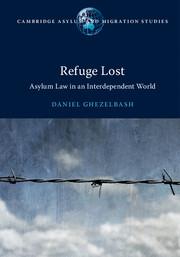Crossref Citations
This Book has been
cited by the following publications. This list is generated based on data provided by Crossref.
Nickerson, Angela
Byrow, Yulisha
O’Donnell, Meaghan
Mau, Vicki
McMahon, Tadgh
Pajak, Rosanna
Li, Susan
Hamilton, Amber
Minihan, Savannah
Liu, Candy
Bryant, Richard A.
Berle, David
and
Liddell, Belinda J.
2019.
The association between visa insecurity and mental health, disability and social engagement in refugees living in Australia.
European Journal of Psychotraumatology,
Vol. 10,
Issue. 1,
Sivunen, Nina
2019.
An Ethnographic Study of Deaf Refugees Seeking Asylum in Finland.
Societies,
Vol. 9,
Issue. 1,
p.
2.
Lelliott, Joseph
2019.
Crimmigration in Australia.
p.
275.
Crock, Mary
2019.
Refugee Protection in Australia: Policies and Practice.
Revue européenne des migrations internationales,
Vol. 35,
Issue. 1-2,
p.
239.
Smith-Khan, Laura
2019.
Why refugee visa credibility assessments lack credibility: a critical discourse analysis.
Griffith Law Review,
Vol. 28,
Issue. 4,
p.
406.
FitzGerald, David Scott
2020.
Remote control of migration: theorising territoriality, shared coercion, and deterrence.
Journal of Ethnic and Migration Studies,
Vol. 46,
Issue. 1,
p.
4.
Fourer, Margarita
Dietrich Jones, Natalie
and
Ciftci, Yusuf
2020.
Offshore Processing Arrangements: Effect on Treaty Ratifications of Receiving States.
Laws,
Vol. 9,
Issue. 4,
p.
23.
Hodgson, Natalie
2020.
International criminal law and civil society resistance to offshore detention.
Australian Journal of Human Rights,
Vol. 26,
Issue. 3,
p.
449.
Missbach, Antje
and
Palmer, Wayne
2020.
People smuggling by a different name: Australia's ‘turnbacks’ of asylum seekers to Indonesia.
Australian Journal of International Affairs,
Vol. 74,
Issue. 2,
p.
185.
Tan, Nikolas Feith
2021.
Community Sponsorship in Europe: Taking Stock, Policy Transfer and What the Future Might Hold.
Frontiers in Human Dynamics,
Vol. 3,
Issue. ,
橋本, 直子
2021.
分野別研究動向(難民・強制移住学).
Japanese Sociological Review,
Vol. 71,
Issue. 4,
p.
704.
Tennis, Katherine H.
2021.
Offshoring the Border: The 1981 United States–Haiti Agreement and the Origins of Extraterritorial Maritime Interdiction.
Journal of Refugee Studies,
Vol. 34,
Issue. 1,
p.
173.
de Bengy Puyvallée, Antoine
and
Bjørkdahl, Kristian
2021.
Do-Gooders at the End of Aid.
Gammeltoft-Hansen, Thomas
2021.
Do-Gooders at the End of Aid.
p.
38.
Jefferies, Regina
2021.
Bringing externalization home: the International Civil Aviation Organization and ‘entry screening’ in Australia.
Globalizations,
p.
1.
Hamlin, Rebecca
2021.
Trump’s Immigration Legacy.
The Forum,
Vol. 19,
Issue. 1,
p.
97.
Gorman, Cynthia S.
2021.
Defined by the Flood: Alarmism and the Legal Thresholds of US Political Asylum.
Geopolitics,
Vol. 26,
Issue. 1,
p.
215.
Crock, Mary
Ghezelbash, Daniel
Reich, Sudrishti
and
Stevens, Rebekah
2022.
Law and Migration in a Changing World.
Vol. 31,
Issue. ,
p.
99.
FitzGerald, David Scott
and
Hirsch, Asher
2022.
Norm-busting: rightist challenges in US and Australian immigration and refugee policies.
Third World Quarterly,
Vol. 43,
Issue. 7,
p.
1587.
Ghezelbash, Daniel
2022.
Technology and countersurveillance: holding governments accountable for refugee externalization policies.
Globalizations,
p.
1.



